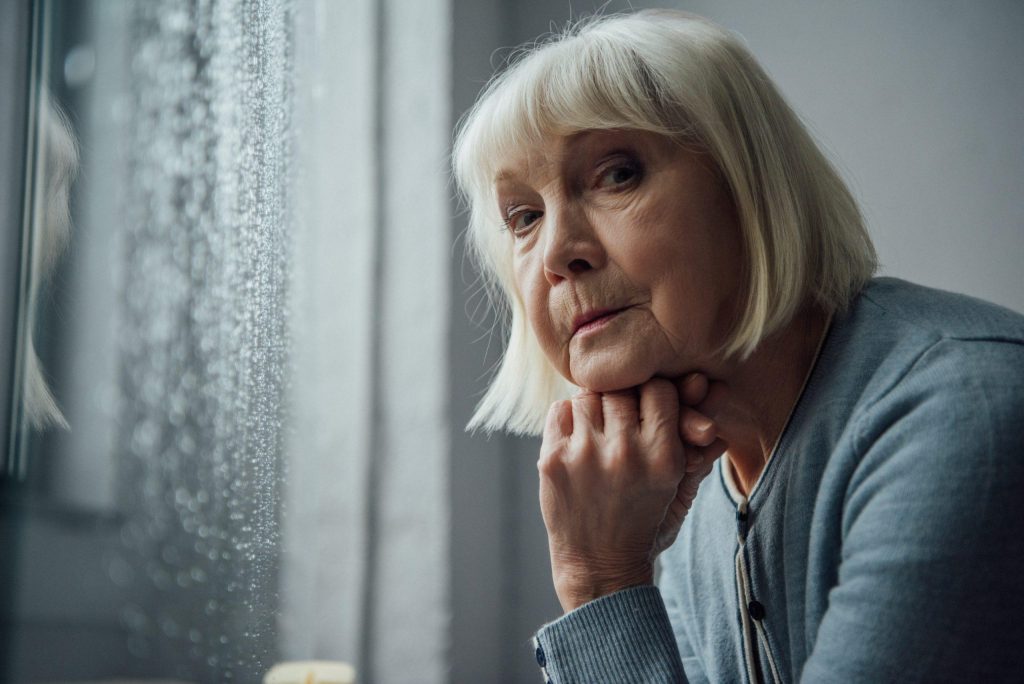Depression is a mood disorder that can affect how you feel, think, and handle daily activities such as eating, sleeping, and connecting with others. While depression in seniors is common, it’s not a normal part of aging. According to the National Institute on Aging, 80% of seniors have at least one chronic health condition, and nearly 50% have two or more, which dramatically increases the risk of depression. While feeling occasional sadness is a normal part of life, long-lasting depression is not. At Providence House we want everyone to be aware of the signs of depression in older adults, so the senior loved ones in our lives can get the best possible care.
Signs and Symptoms of Depression in Older Adults
While depression can look and feel different for everyone, some common symptoms can act as warning signs. We at Providence House recommend looking out for any of the following:
- Feelings of despair, hopelessness, or chronic pessimism
- Loss of interest in activities and hobbies that usually provide joy and comfort
- Overeating or loss of appetite
- Feelings of worthlessness
- Fatigue and changes in sleeping habits
- Memory problems, difficulty concentrating, remembering details, and making decisions
- Neglecting personal care such as skipping meals, forgetting medication, and neglecting personal hygiene
- Thoughts of suicide and suicide attempts
Causes of Depression in Older Adults
While there is no single cause of depression in seniors, there are biological, social, and psychological factors that can contribute to depression. Complications and significant life changes associated with aging can also increase the risk of depression in older adults. In our experience at Providence House, these are some of the most common causes of depression:
- Health problems.
Depression is often linked to illness, chronic or severe pain, and cognitive decline.
- Loneliness and isolation.
Living alone, losing a spouse or friends, and decreased mobility due to aging can be hard to cope with and often lead to feelings of depression.
- Loss of purpose.
Transitioning from work to retirement can often cause a loss of identity, status, and financial security, and lead to depression.
- Genetic factors.
Those with a family history of depression are more likely to develop it than those who do not have a history of the illness.
- Personal history.
Older adults who have experienced depression in their younger years are more at risk for developing depression later in life.
How to Help a Parent or Aging Loved One with Depression
If you suspect your loved one is suffering from depression, it can be difficult to know how to approach the topic. Whether you notice your parent disengaging from friends and family, avoiding activities they once enjoyed, or displaying any of the warning signs listed above — talking with your loved one about their behavior can lead them to receive the treatment they need. As you prepare to talk with your loved one, we at Providence House suggest you consider using these tips to frame your discussion:
- Stay calm.
Depression is often a personal topic and can be uncomfortable to share with someone else. As you ask your loved ones about how they have been feeling, take their answers in stride. Your calmness may encourage them to open up more and share more candidly.
- Offer a support system.
Scheduling family and friends to visit or call each day, spending mealtimes together, or even considering making moving arrangements could help eliminate some of the factors contributing to the depression.
- Suggest treatment options.
Once your loved one is ready to address their depression, you might consider making an appointment with their health care provider to discuss treatment options.
Finding Depression Support at Providence House Assisted Living
Our trained medical staff and caregivers are dedicated to providing high-quality support for every resident living in our Providence House community. We know how difficult depression can be for both individuals and their families. From support groups to exercise classes and high-quality meal offerings, each of our communities is dedicated to offering extra care to those suffering from depression. To learn more about our offerings or to schedule a tour, please contact us.

